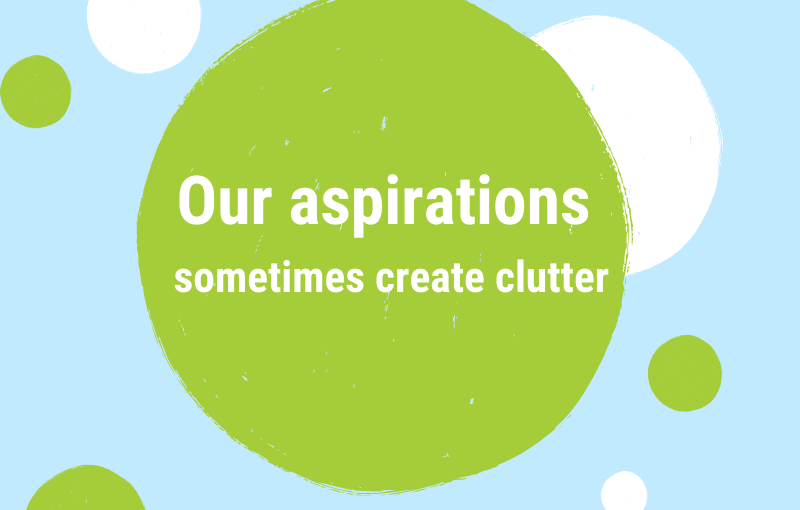Clutter is a very personal issue.
We all have our own personal special clutter hotspots – those areas in our homes and those categories of belongings that accumulate the biggest amounts of stuff that actually no longer serves us.
We all define ‘clutter’ differently, which means that ‘your clutter is different to mine’ (read more).
We also struggle for different reasons to let go of useless possessions, and our decluttering strategies and solutions differ.
However, most of us share the experience that it is particularly tough to make decluttering decisions with regard to these two types of belongings:
We particularly struggle to let go of sentimental and aspirational belongings.
Our sentimental attachment to certain possessions is usually linked to our past – to previous phases in our lives and to our past identities: Sentimental belongings refer to past experiences, remind us of people who were/are important to us, or keep memories of special events and accomplishments.
Our aspirational belongings have more to do with our future, or our former dreams of the future: They represent our current and past ambitions and aspirations, our ideas of our ideal ‘fantasy’ selves and lives.
Today, I wish to share some thoughts about aspirational belongings – sentimental items will be discussed in another article.
What are ‘aspirational’ belongings?
Aspirational items are the things that we bring into our homes because we want to
-
- create and project a certain image and lifestyle,
- develop or improve a special capability or activity,
- help ourselves believe that we are a certain type of person with a certain set of characteristics and abilities.
Any category of belongings can contain aspirational stuff and therefore can also contain aspirational clutter:
books and papers, kitchen stuff, groceries, clothes and shoes, sports equipment, tools, arts and crafts supplies, etc.
Examples of aspirational stuff that turned into aspirational clutter:
-
- We organise the transport of our grandmother’s dinner table with the 8 chairs to our home because we intend to entertain family and friends more often. However, we don’t make any changes in our social life. The dinner table is now a ‘waste paper collection centre’.
- We decide to start running to improve our fitness and health and buy trainers and running clothes. Our running career ends two weeks later but we keep the equipment because we truly plan to start running again – maybe next summer?
- We dream about starting a small business and buy any book that offers advice for start-up entrepreneurs. Three years later we are very happy in our corporate job and plan the next step of our career. However, the never-read books were so expensive, it would be a waste to give them away, wouldn’t it?
- We moved to a new place with a little backyard garden and were looking forward to realise our ‘aspirational’ landscaping plans. We bought and now own all the necessary equipment – but we lack the time and energy to use it. However, we can’t give up our dream of becoming a gardener, at some point in the future. That’s why we feel we have to keep all the gardening stuff.
Why decluttering aspirational clutter is so hard
Letting go is rarely easy.
Letting go of aspirational stuff is particularly hard because it involves letting go of hopes, dreams, intentions, aspirations, and ambitions.
-
- We have to be willing to stop lying to ourselves, we have to admit failure.
- We have to admit that we made some wrong decisions.
- We have to be very honest and brave to accept that some parts of our ideal fantasy selves just don’t exist.
- We have to be willing to experience negative feelings – such as guilt, shame, or disappointment.
- We have to invest time and thought work to find out who we really are (not who we wished we were), what’s really important to us, and how we truly want to spend our time and life.
Practising self-awareness and intentional decluttering go hand-in-hand
While we learn to get rid of excessive and useless stuff, we simultaneously learn about ourselves and what’s meaningful to us.
And as soon as we begin to understand who we truly are and what we really want to have in our life, we find it increasingly easier to make decisions about what to keep in our life and what to let go.
How can we clear up aspirational clutter?
Asking powerful questions and taking the time to find our answers to them.
Ask yourself:
-
- Why do I keep this thing? What is the reason behind my decision? Do I like my reason?
Another powerful question related to our aspirational stuff:
-
- What if now is the right time to let go of these old aspirations (and the related stuff) – so that I can create space for my current and future ambitions and aspirations?
Letting go of unrealised aspirations not only creates space.
It will also bring clarity and lightness. It makes it easier to move on – into the life we truly want to live.


Thanks Margot for clarifying yet another area of my ‘holding on to stuff’ without giving it any thought until it gets to the point of there’s no space left in the spare room!
The questions to reflect on – of why – are so helpful and I’m going to try them today!
I am sure the questions will get you started, Di, – and you’ll get it sorted out. I always find that making decisions about this type of belongings always brings feelings of freedom and lightness.